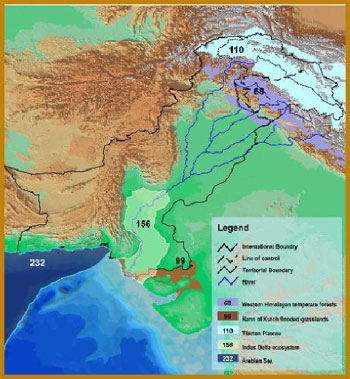
The development of the Indus for All Programme is owed to an exhaustive process of consultations.

In 1997, WWF-International embarked upon a global biodiversity conservation initiative guided by WWF’s overall global strategy of 6 target-driven and thematic programmes (freshwater, forests, species, toxics, marine and climate change). With the assistance of UNEP and the National Geographic Society, 238 ecoregions were prioritized globally (commonly referred as G-200) to reflect their ecological significance and biodiversity richness. The area of five ecoregions viz: Western Himalyan Temperate Forests, Tibetan Plateau, Rann of Kutch, Indus Ecoregion and Arabian Sea fall within Pakistan’s territories. Indus ecoregion fully situated within Pakistan and the other four are trans-boundary. In addition, this ecoregion is one of the forty biologically most significant ecoregions in the world.
WWF-Pakistan’s Indus Ecoregion Conservation Programme was developed based on the study, “Root Causes of Biodiversity Loss in Mangrove Ecosystems” in 1999. This study highlighted the complex linkages that existed between biodiversity loss and associated social, economic and policy drivers and emphasized the need for a more holistic approach to biodiversity conservation.
The study provided the basis for a stakeholders’ workshop in December 2002, to assess the current situation of the Indus Ecoregion. Attended by over 60 experts from all walks of life, the workshop resulted in the following outcomes:
The 2002 workshop was followed by a 5-day “Biodiversity Visioning and Ecoregion Conservation Planning” workshop from July 12-16 2004 attended by over 50 stakeholders from line departments, civil society, academia and the private sector. The first two days resulted in a 50-year Biodiversity Vision for the IER which was then elaborated into an integrated Indus Ecoregion Conservation Plan (IECP). The workshop succeeded in developing a consensus on priority habitats and conservation targets for the next 10 - 20 years and identification of areas for institutional cooperation.
The aforementioned workshops, consultations and other extensive efforts by WWF and stakeholders from a diversity of institutions culminated in the development of the Indus for All Programme.
|